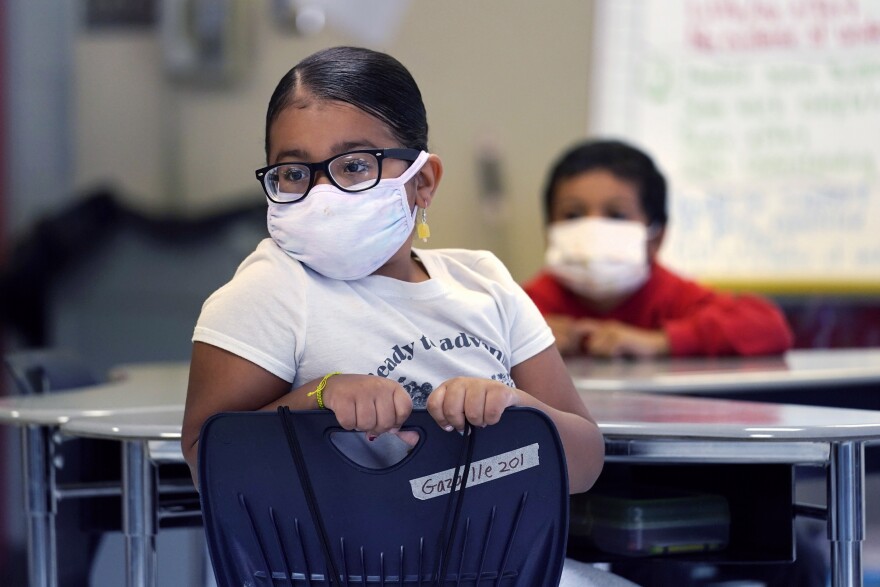TAMAQUA, Pa. - Over the summer, Pennsylvania state officials said school mask policies would be left up to local districts.
Wendy Nelson, a mother of two in the Tamaqua Area School District, was ready for a mask-optional year. It’s what her district called for.
But an eleventh-hour mandate issued by the state’s health department upended those plans and required masks in all of the commonwealth’s K-12 schools.
“My family is completely okay with it,” said Nelson. “It's the law. Whatever, we move forward.”
But Nelson couldn’t move forward. In early September, Tamaqua’s superintendent, Raymond J. Kinder, released a letter to families explaining that the district’s school board decided masks would remain optional in Tamaqua. Essentially, the district opted to not comply with the health department’s order.
Motivated by a desire to abide by a state-issued public health order, Nelson sent her children to school in masks. But she questioned if the district had the authority to opt-out of the mandate.
“It's unthinkable what they're teaching my child(ren) right now. That it's okay to go ahead and buck the system because you don't like it,” said Nelson.
Nelson dug around to see if Tamaqua’s school leaders really could “buck the system.” She read through the school board’s policies and procedures and found it’s supposed to comply with all applicable local, state, and federal laws and regulations.
WLVR reached out to the district’s superintendent and school board representative but neither responded to our request for an interview.
Tamaqua Reverses Course
Rebecca Young, an attorney at King, Spry, Herman, Freund & Faul, explained that school board members don’t have discretion when it comes to following a state-issued health mandate.
“They are bound to follow the law. They take an oath of office,” said Young.
Young also explained that disregarding the order could result in legal penalties.
“All of these actors, the board or the superintendent, if they willfully disregard this order can be liable for criminal sanctions for failure to abide by the law,” said Young. “They can be subject to civil liability to someone who's injured because of them not following this order.”
Young went on to explain that noncompliance could also affect a district’s workers’ compensation coverage.
The state formally weighed in on Tamaqua’s decision on Sept. 8. That’s when Pennsylvania Secretary of Education Noe Ortega sent Tamaqua’s school board a letter warning members about potential legal issues associated with disregarding the state’s school mask mandate.
In his letter, Ortega also wrote “the administration is aware that some districts’ liability insurers have explored canceling coverage as a result of those districts’ possible illegal conduct and potential purposeful violations of law.”
Just shy of the two-week mark since receiving Ortega’s letter, Tamaqua’s school board passed a motion to follow the state’s mask mandate.
The Science Underpinning the Mandate is Far From Settled
In Education Secretary Ortega’s letter to Tamaqua’s school board, he included a line that said “recent studies have clearly shown” wearing masks in school helps reduce the spread of COVID-19 among students and staff.
But some doctors argue that the science on masking in the K-12 setting is far from settled.
A recent study from the Centers for Disease Control and Prevention found requiring students to wear masks in school did not have a “statistically significant” benefit.
Dr. Elissa Perkins is an associate professor of emergency medicine at the Boston University School of Medicine. She is also the director of emergency medicine and infectious disease management at Boston Medical Center. She said the U.S. doesn’t even have the infrastructure in place to study what mitigation measures actually work in schools.
“We are really operating in a void of good information about what is and is not effective,” said Perkins.
Perkins explained that while lab studies have shown face masks work in preventing things like droplet transmission, that’s not the same as showing masks are effective in a “real-world setting.”
“Children wear masks differently, right? Children move their masks. Children take their masks off. Children touch their hands to their masks. They put their hands inside their mouths,” Perkins said.
She recommends masking in schools if a community has “sky-high” COVID rates, hospital capacity is overwhelmed and there are low vaccination rates. But she said she doesn't think it makes sense to have a statewide mandate, like Pennsylvania’s.
“I think it is much more reasonable to make them at a district level because that is truly where you can best evaluate the risks,” said Perkins.
Whether the science is settled or not, the American Academy of Pediatrics still recommends universal masking in schools.
However, in Pennsylvania, the debate has moved to the courts. Multiple lawsuits have been filed challenging the health department’s order.
That means children and parents like Wendy Nelson in Tamaqua, are left looking at another school year filled with uncertainty.
Sign up for our WLVR weekly newsletter to stay up to date with the latest news from the Lehigh Valley and across Pennsylvania.

